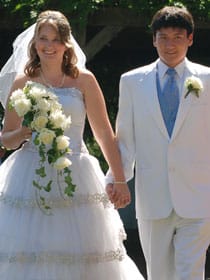
Read part one here.
Living on opposite sides of the world, it would seem unlikely that I, a small-town American girl, would even meet my future husband, Rakhat, who is from a small village in Kyrgyzstan. However, as it happened, Peace Corps volunteers lived with his family while he was growing up, inspiring him to learn English. His ongoing interest in America eventually led him to Concordia Language Villages, where he found summer employment teaching Russian in Minnesota. My interest in the Russian language, born during high school when I volunteered with a program assisting Russian orphans, similarly led me to Concordia Language Villages. It was there that we met and fell in love.
We were married the next summer in Kyrgyzstan in an experience I’ve described in a previous article on this site. That article described my experience as a foreigner in Kyrgyzstan. There is another half of the story, however, as much of the cultural interaction would replay as we moved to America and had our second wedding here with Rakhat’s parents in attendance and as Rakhat looked for permanent employment.
Rakhat’s parents were amazed by the differences between Kyrgyz and American culture. In Kyrgyz culture, there are numerous elaborate and strictly observed traditions that serve to respect elders. Everything from seating arrangements to serving portions is regimented. My American family, which in contrast is traditionally informal, must have seemed bizarrely chaotic to them, to say the least. With many out-of-state relatives staying with us for the wedding and milling randomly through the home, we obviously lacked the structure that defines Kyrgyz families. Rakhat’s parents, luckily, consider themselves to be democratichniye(a Russian word that directly translates as “democratic,” but which they seemed to use to mean “tolerant” or perhaps even “cosmopolitan”).
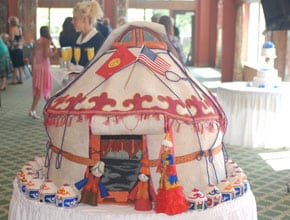
Communication was also a challenge as Rakhat’s parents do not speak English and my relatives do not speak Kyrgyz or Russian. Still, they found ways to interact and have fun together. Rakhat’s parents, staying at my grandfather’s cottage on a lake, were excited to learn how to swim, kayak, and ride jet skis. My mother, a former swimming teacher, taught Rakhat’s mother to swim through gestures. Of course, there were some miscommunications, most notably when our fathers decided to take a sailboat out together. When a particularly strong wind hit, my father gestured to Rakhat’s father to let the sail out. Misunderstanding, Rakhat’s father pulled in the sail, and the boat promptly flipped over and sent both fathers plunging into the water. It must have taken some difficulty to right the boat, but the incident became a subject they both joked about.
Just as I had to acclimate to Kyrgyz food, Rakhat’s parents also had adventures in being introduced to American food. Rakhat’s parents loved Taco Bell and had never had anything similar to Mexican food before. The “Crunchwrap” in particular was a huge hit. However, some food didn’t sit well with them. My mother, knowing that the Kyrgyz love meat, decided to make steaks one night. She bought New York Strip, and prepared delicious medium rare steaks.
Although I lived with them and learned to cook Kyrgyz food from them, I didn’t know what a major impact this strange American delicacy would have on them. Although it is not something that embraces all of Kyrgyzstan, my in-laws always boil their meat, as do many other Kyrgyz. For them, the idea of eating meat still containing blood is strange and, to say the least, unappetizing to them. As they cut into their steaks, they were appalled at the rich juice streaming off onto their plates. However, the Kyrgyz are also known for their subtlety, and our guests made no comments. They stuck to the potatoes and salad.
The next night (perhaps not surprisingly), Rakhat’s mother decided to cook food common in Kyrgyzstan for everyone, and prepared eggplant salad, plov, and borsok. Most ingredients for Kyrgyz food are very basic, and thus we did not have difficulty in finding them. My family, always eager to try new foods, loved the Kyrgyz dishes. It is left to speculation, however, whether they would have been so accepting of the feast had it included komis, the hallmark of Kyrgyz drinks, which is made from fermented horse milk.
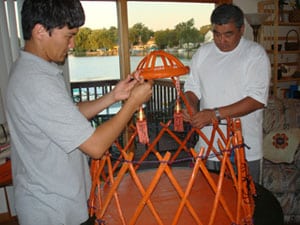
Rakhat’s parents were most taken by the cleanliness and orderliness of America as we showed them the tourist sights of Michigan: the Detroit zoo, GM’s headquarters, and the Great Lakes. It was often the simple things that intrigued them the most. Our sprinklers, which pop out of the ground, were a great surprise as they had never seen the technology before. Rakhat’s parents also came to love American garage sales. In Kyrgyzstan, it is difficult to find inexpensive, high-quality used goods. Rakhat’s parents bought a miniature battery TV, a stroller, children’s toys, and clothes. Garage sales became a regular weekend adventure, and Rakhat’s parents ended up buying too much to fit in their bags. Rakhat and I will have suitcases full of the remainder of the purchases the next time we visit Kyrgyzstan.
When the time neared for Rakhat’s parents to leave, our parents exchanged parting gifts – a tradition that both of our cultures honor. My parents gave Rakhat’s parents a mixer and measuring cups with which to make key lime pie, another food that they were introduced to in America and which they particularly enjoyed. Rakhat’s mother gave my mother beautiful earrings engraved with traditional Kyrgyz designs.
When it was time for Rakhat’s parents to leave, parents and son had a tearful farewell. We did not know when we would see them again, because traveling to Kyrgyzstan is both expensive and time consuming.
Afterwards, we embarked on the long period of waiting for Rakhat’s green card and navigating the bureaucracy surrounding it. Rakhat, as he had done several times before, had arrived in America on the basis of a J-1 visa, which is a temporary work visa. It allows him to work over the summer at Concordia, which he did again the summer after we married in Kyrgyzstan. The visa was still good to allow him to stay for our wedding in the States afterwards. Because we were married legally in the States, he was then able to stay in the US legally while his green card application was filed and considered. However, the J1 visa does not allow its holder to work anywhere except the organization that originally sponsored it, meaning that Rakhat would have to spend long idle hours at home while we waited for his green card, which would allow him to find other employment. It was very difficult for Rakhat to sit at home for months on end.
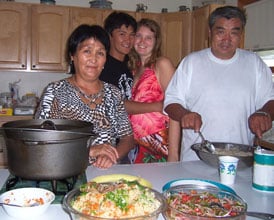
The process of dealing with immigration procedures is generally a foreign experience even to those who have lived all their lives under the government that enforces them. The experience was thus perhaps as culturally jolting to me as to Rakhat – perhaps even more so to me, as the counties of the former Soviet Union, compared to the US, tend to have much more extensive bureaucracies that reach into more facets of life.
To help us with the green card process, we contacted an immigration lawyer early on. We had actually asked the Department of Homeland Security about whether an immigration lawyer would help, and they had replied that without a lawyer we would likely have to wait over a year. With a lawyer, the process would likely be significantly shorter as the lawyer already knows exactly when the steps in the process should be taken and how to make sure they are processed quickly.
In January, we finally heard good news from our lawyer. We had received a date to appear at the local immigration office, where we would have to prove that we were really living as husband and wife and not under a “fictitious marriage” that some use to immigrate illegally. Our lawyer instructed us to prepare to answer personal questions that could be as innocent as discussing the spouse’s hobbies or as awkward naming the other’s preferred brand of underwear.
Arriving at the immigration office, I felt overwhelmed by the sheer number of people waiting for interviews so that they too could immigrate. The office was crowded, with around fifty people anxiously awaiting their appointment. They came from a variety of backgrounds, though most were noticeably from the Middle East, perhaps due to the fact that Iraqis and Afghans currently have a special visa regime which allows them to immigrate to the US more easily.
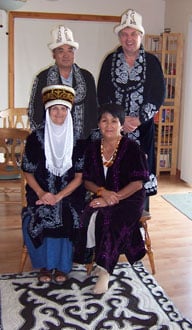
Although the office was crowded, we had to wait for only a few minutes for our immigration officer to appear. He was friendly, and was mostly interested in looking closely at our wedding pictures. Thankfully, we faced no awkward questions, and he soon informed us that he deemed our marriage legitimate and would grant Rakhat a green card. We were ecstatic and wasted no time in going out to celebrate. Taking the day off work, we went out to our favorite restaurant and then to my family’s cottage in the country to spend some time alone together.
We cleared this first hurdle, but a green card by no means guaranteed that Rakhat would be able to find a job, especially since he had come to America during the economic crisis. Rakhat had high hopes that he would achieve the American dream of working hard and providing a good life for his family. However, in Michigan during the recession, with the collapse of the auto industry, and a state unemployment rate now over 15%, this dream seems to be out of reach for many if not most people. Although he had been to America several times before, during other times, he was mostly sheltered within the confines of Concordia Language Villages. This was one of the first times that living here provided some culture shock for him. The American dream can’t always be achieved by force of will and lots of elbow grease.
Over the summer, we drove to Washington D.C. It was Rakhat’s first time in the country’s capital, and he was very excited to see the White House and other historic places that he had read so much about. He was also very interested to see some of the organizations in which we may work someday such as the Council on Foreign Relations and IREX.
Despite the challenges we initially faced, Rakhat was hired by the local firefighting department and is now working on obtaining his EMT license. He also found part-time work as a preschool teacher. At the Concordia Language Villages, he had acquired several summers’ worth of experience teaching children, and the preschool was looking for someone who had experience. He is enjoying his work, which allows him to contribute to society and furthers his ambitions to be involved in government. However, we both hope to eventually enter the field of international relations. I have now been accepted to graduate studies at Missouri State University’s Defense and Strategic Studies program and will begin studies this spring semester.
Through thick and thin, Rakhat and I have stayed together and our love is just as strong as when we were first married. We plan to both further our knowledge bases and to try to build our resumes through publishing and volunteer work. In these tough times, many couples are facing enormous challenges. However, it is through these challenges that we grow and it is through growth that we succeed and learn that love is strong enough to overcome anything.





